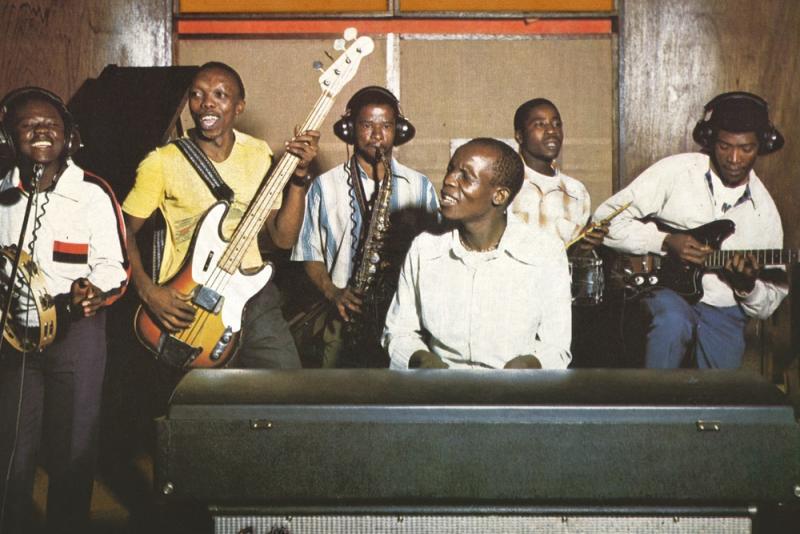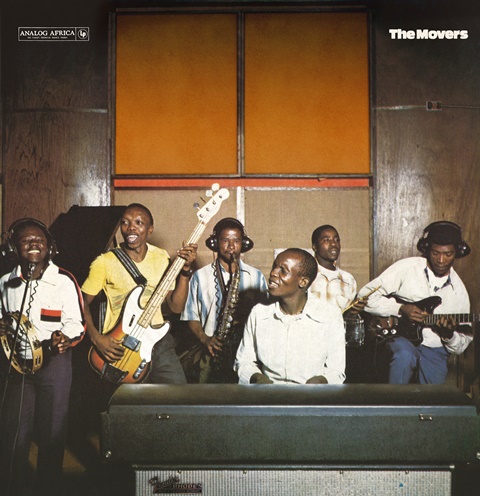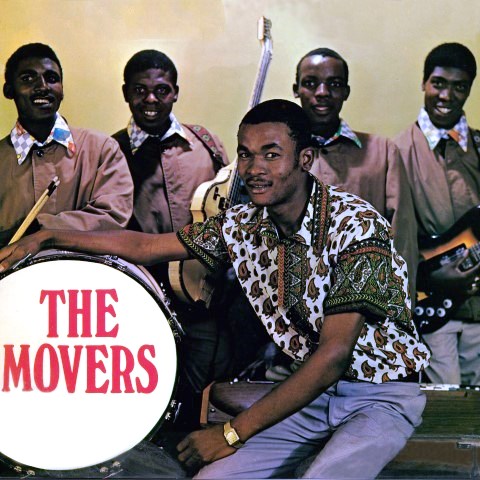Music Reissues Weekly: The Movers - Vol 1 1970-1976 | reviews, news & interviews
Music Reissues Weekly: The Movers - Vol. 1 1970-1976
Music Reissues Weekly: The Movers - Vol. 1 1970-1976
Unstoppable South African groove machine gets another day in the sun

After a burst of gun-shot drumming, “Hot Coffee” instantly hits its groove. Simple but insistent guitar, a rubbery bass line and electric organ all fall into line. For the instrumental’s two-and-half minutes, it is unstoppable.
“Gig Soul Party” is as tight but more ornate as the organ playing incorporates flourishes. There’s a spindly solo guitar line and some funky-drummer drumming too. But it’s as effective. Dance floors would have been crowded.
 Then there’s “Soul Crazy,” another instrumental with the same emphasis on a rigid rhythmic foundation and forward motion. A guitar solo is minimal and short, but spot-on in this context.
Then there’s “Soul Crazy,” another instrumental with the same emphasis on a rigid rhythmic foundation and forward motion. A guitar solo is minimal and short, but spot-on in this context.
The band which recorded these winners was The Movers, a South African outfit which formed in the Alexandra township outside Johannesburg in 1969. Their first album emerged in 1970 and was followed, up to 1991, by about 25 more. Around 100 singles and EPs were issued. All the time, there seems to have been have line-up changes and also a shift from instrumental music to the incorporation of various vocalists. The first Movers album included the tracks “Soul On The Moon” and “Soul Crazy,” so it was obvious from where inspiration was drawn.
Vol. 1 1970-1976 is a 14-track Movers comp mixing instrumentals and vocal cuts. For those unfamiliar with their whopping back catalogue, it’s an introduction and presumably represents the band in the best light. As there no clunkers, the job is done.
 According to the liner notes, The Movers are “one of the most legendary bands to emerge from the South African soul scene, there is almost no information available about the group or their career.” The text gets to grips with the information gap by including interviews with their founder Lulu Masilela, early vocalist Blondie Makhene (age 14 when he joined the band in 1970) and their saxophonist Kenneth Siphayi.
According to the liner notes, The Movers are “one of the most legendary bands to emerge from the South African soul scene, there is almost no information available about the group or their career.” The text gets to grips with the information gap by including interviews with their founder Lulu Masilela, early vocalist Blondie Makhene (age 14 when he joined the band in 1970) and their saxophonist Kenneth Siphayi.
Siphayi recounts that their early single “Crying Guitar” (not included here) “sold over 500,000 copies within a period of three months and with my first royalty cheque I bought a Volkswagen bus that would enable us to tour with more freedom and transport the equipment with more ease. We criss-crossed the country with that bus, visiting places we’d only heard of from newspapers, reaching Cape Town, Durban and even Pietermaritzburg.” Siphayi asserts they had sold “millions of records” by 1975. Makhene says “’Hopeless Love’ (also not heard here) became the first South African recording to crossover in the then racially-segregated South Africa.”
Taking all this at face value, The Movers must have been a significant band for South Africa: the sales, the volume of releases, the shows they played and the crossover to a white audience add up to an important position. And musically, this is hot stuff. Nonetheless, Vol. 1 1970-1976 frustrates as the original release date for each track is not given. Nor is there anything saying which singles or LPs the tracks came from. Despite these exasperating omissions, dig in. There was a reason they were called The Movers. No one could remain still during these grooves. The case is made.
- Next week: The Telstar Story and The Heinz Sessions Vol 1. Bounteous yield from Joe Meek’s for-real legendary tapes.
- More reissue reviews on theartsdesk
- Kieron Tyler’s website
Share this article
The future of Arts Journalism
You can stop theartsdesk.com closing!
We urgently need financing to survive. Our fundraising drive has thus far raised £49,000 but we need to reach £100,000 or we will be forced to close. Please contribute here: https://gofund.me/c3f6033d
And if you can forward this information to anyone who might assist, we’d be grateful.

Subscribe to theartsdesk.com
Thank you for continuing to read our work on theartsdesk.com. For unlimited access to every article in its entirety, including our archive of more than 15,000 pieces, we're asking for £5 per month or £40 per year. We feel it's a very good deal, and hope you do too.
To take a subscription now simply click here.
And if you're looking for that extra gift for a friend or family member, why not treat them to a theartsdesk.com gift subscription?
more New music
 The Last Dinner Party's 'From the Pyre' is as enjoyable as it is over-the-top
Musically sophisticated five-piece ramp up the excesses but remain contagiously pop
The Last Dinner Party's 'From the Pyre' is as enjoyable as it is over-the-top
Musically sophisticated five-piece ramp up the excesses but remain contagiously pop
 Moroccan Gnawa comes to Manhattan with 'Saha Gnawa'
Trance and tradition meet Afrofuturism in Manhattan
Moroccan Gnawa comes to Manhattan with 'Saha Gnawa'
Trance and tradition meet Afrofuturism in Manhattan
 Soulwax’s 'All Systems Are Lying' lays down some tasty yet gritty electro-pop
Belgian dancefloor veterans return to the fray with a dark, pop-orientated sound
Soulwax’s 'All Systems Are Lying' lays down some tasty yet gritty electro-pop
Belgian dancefloor veterans return to the fray with a dark, pop-orientated sound
 Music Reissues Weekly: Marc and the Mambas - Three Black Nights Of Little Black Bites
When Marc Almond took time out from Soft Cell
Music Reissues Weekly: Marc and the Mambas - Three Black Nights Of Little Black Bites
When Marc Almond took time out from Soft Cell
 Album: Mobb Deep - Infinite
A solid tribute to a legendary history
Album: Mobb Deep - Infinite
A solid tribute to a legendary history
 Album: Boz Scaggs - Detour
Smooth and soulful standards from an old pro
Album: Boz Scaggs - Detour
Smooth and soulful standards from an old pro
 Emily A. Sprague realises a Japanese dream on 'Cloud Time'
A set of live improvisations that drift in and out of real beauty
Emily A. Sprague realises a Japanese dream on 'Cloud Time'
A set of live improvisations that drift in and out of real beauty
 Trio Da Kali, Milton Court review - Mali masters make the ancient new
Three supreme musicians from Bamako in transcendent mood
Trio Da Kali, Milton Court review - Mali masters make the ancient new
Three supreme musicians from Bamako in transcendent mood
 Hollie Cook's 'Shy Girl' isn't heavyweight but has a summery reggae lilt
Tropical-tinted downtempo pop that's likeable if uneventful
Hollie Cook's 'Shy Girl' isn't heavyweight but has a summery reggae lilt
Tropical-tinted downtempo pop that's likeable if uneventful
 Pop Will Eat Itself's 'Delete Everything' is noisy but patchy
Despite unlovely production, the Eighties/Nineties unit retain rowdy ebullience
Pop Will Eat Itself's 'Delete Everything' is noisy but patchy
Despite unlovely production, the Eighties/Nineties unit retain rowdy ebullience
 Music Reissues Weekly: The Earlies - These Were The Earlies
Lancashire and Texas unite to fashion a 2004 landmark of modern psychedelia
Music Reissues Weekly: The Earlies - These Were The Earlies
Lancashire and Texas unite to fashion a 2004 landmark of modern psychedelia

Add comment